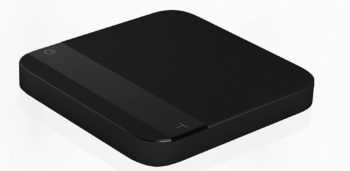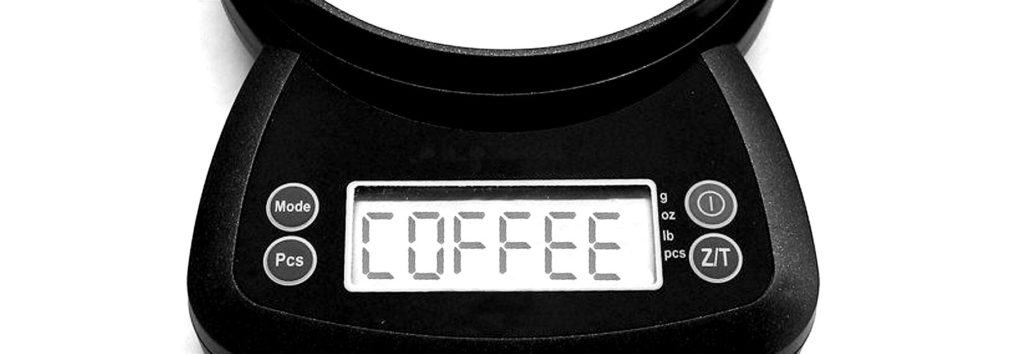This page has one goal: to identify the best coffee scales sold today. If it was possible we’d simply identify the best coffee scale, but there are so many scales sold and so many uses, so we’ll focus on the top few models of 2020.
Some of the questions you’ll need to answer before making a purchase are obvious…
- Is a particular scale for home or professional use?
- Is the scale good for pour-over coffee but bad for espresso?
- What if it’s a great scale but disproportionately expensive, fragile, or large?
Questions like these will be taken into consideration as we review and point out our top coffee scales.
For reasons of practicality we’ll focus on digital scales and those with at least a 1000g capacity, so that it can accommodate something like a Chemex or press pot if the need should arise.
The Best Coffee Scale
Everything in this guide technically has to do with “coffee” but for our purposes we will differentiate between brewed coffee and espresso. This section will be for scales that are ideal for producing a cuppa joe, regardless of if it’s a pour-over, press pot (french press), drip machine, or anything else you can come up with.
And here are the best coffee scales of all those we’d tested, researched, reviewed, and/or used…
- Jennings CJ-4000: The Jenning is a classic scale with coffee lovers and professionals alike. It’s well-known for its reasonable price, durability, reliability, excellent battery life, and 4000g gram (8.8 pound) weight limit. The main downside of this scale is that it has a resoution of 0.5g so it’s not great for espresso perfectionists. Another downside is the size, as the scale isn’t particularly small (12 x 7.5 x 5 inches).
See our full CJ-4000 scale review. I purchased my CJ-4000 in January 2012 and still use it almost every day. - Acaia Pearl Model S: This one is a toss-up between the coffee and espresso categories, but either way, it’s a great scale. It’s a bit large and a bit thick, but it’s super fast and super accurate. It has 0.1g precision and it’s large enough to hold a press pot or Chemex 6-cup where the smaller Lunar scale can’t. We strongly prefer the Pearl Black, which is the newer model versus the white with an easier to read display and an included rubber guard for its plastic top.
Note that the latest version of the Acaia Pearl Model S is the 2020 version of the Pearl, which has been around since 2013. The Model S has more smart, smartphone-connected features than the original and has a better display, but is largely the same scale.
See below for a Pearl review. - Hario Coffee Drip Scale with Timer: Like the Acaia Pearl, the Hario Coffee scale is very much a coffee-focused scale but it’s great at espresso too. We love this scale’s sub-$50 price, it’s all-black coloring, 0.1g precision, and automatic timer. The timer function and generous size make this scale a top pick for pourover coffee (which is almost always done with Hario’s V60 coffee dripper.
- American Weigh Scales AMW-SC-2KG: This popular scale is small, thin, and just $22. It even has a cool blue-backlit LCD display. And did we mention it’s $22? This scale works in 0.1g or 0.01oz increments and has a 4″ x 4″ platform that is just right for espresso, though it’s a bit too small to get a typical portafilter on. This has been a popular choice since 2009 so you know it’s a proven choice.
Best Espresso Scale
Espresso scales are all about accuracy. With the home baristas (and professional baristas) of the world geeking out about a tenth of a gram of coffee going into their grinder, measuring again after the grind, and then measuring the weight of their shots, you know the scale is going to be critical tool.
- Acaia Lunar: The Lunar is the sleeker, much tinier, waterproof version of the Acaia Pearl Model S. Our take: through years of engineering and hard work the team at Acaia somehow discovered ways to make their scale more expensive. Incredible! Joking aside the Lunar is incredibly small, super accurate, impressively well-built and small enough to sit on your espresso machine’s drip tray under an portafilter and measure your shot while it’s being poured. That’s no small feat (even for $220)! The auto tare mode is worth noting: It will tare the scale after you place your espresso cup on it and then when it starts to fill with espresso it will start measuring and start a timer so you can weigh and time your shot without pressing a button.
- Brewista Smart Scale II: This scale might have a silly name (and one that makes you think it’s more for coffee than espresso), but it’s quality choice. With a street price of $90 it’s by no means cheap, but it’s loaded down with features. Some of our favorites include: USB charging, a water-resistant coating, auto-tare, six user modes, a 2000g weight limit, and automatic timer. Of course it has the 0.1g accuracy that you are looking for from a great espresso scale. If you can’t find it with the provided link, try MyBrewista or Seattle Coffee Gear.
- Acaia Pyxis: Similar to the Lunar is the , which is very light and tiny, but it’s $250 and only weighs up to 500 grams (though it does have 0.01 precision). It’s not a very popular scale except with professional baristas.
| Brand | Color | Price (USD) | Top Feature | Link |
|---|---|---|---|---|
| Acaia Lunar | Black | $220 | Smart auto tare | Best Price |
| Acaia Pearl | Black, White | $140 | Fast response | Best Price |
| Hario Scale | Black, Stainless | $40 | Price | Best Price |
| Brewista II | Black | $90 | Full of features | Best Price |

More Coffee Scales
We’ve covered the best, now let’s review the rest. These are all good to very good coffee scales — and if one of them ends up being the right one for you, that’s great! — but we believe the average buyer would be better served with one of the options above.
- Eravsow Digital Hand Drip Coffee Scale: This $20 has a handsome stainless steel build, 0.1g precision (up to 1000g), a 3000g maximum, and built-in backlighting. Our favorite feature is that it’s one of the few affordable scales with a build in timer. It runs on two AAA batteries so you don’t have to worry about plugging it in.
- Ozeri Touch Professional: This crowd-favorite is a new addition to the list. Its clean design and attractive have made it a big hit. The top is tempered glass for heat-resistance. It’s actually the highest capacity scale we’d recommend for coffee, with a range from 1 gram to 5750 grams! Bonus: Batteries are included.
- BrewSmart Bench Scale: This $30 scale from Brewista is simple and effective. It has a 2000g capacity and big, easy-to-hit physical buttons. It’s light on the fancy features but it is affordable and very much gets the top done. This is a workhorse like the CJ-4000 but it trades capacity for 0.1g precision instead of the Jenning’s 0.5g.
- Hario V60 Stainless Steel Drip Scale: This is the higher end version of the Hario coffee scale mentioned above. It uses a stainless steel top instead of a plastic one and a cool white-on-black LCD display, but ultimately it’s 50% more than the standard version and it only looks a little bit cooler.
- Ozeri Pronto Multi-function Kitchen Scale: This is the most basic kitchen scale imaginable: it weighs things, it tares, and it turns off. That’s it. But it’s also $13 and has almost 13,000 positive reviews on Amazon. If you want something that’s simple, cheap, and effective, look no further. Because it uses 1g precision it’s fine for coffee but no accurate enough for espresso. Bonus: it comes in fun colors like lime green and teal blue!
- AmazonBasics Stainless Steel Digital Kitchen Scale: Like it says on the tin, this scale is super basic. Similar to the Ozeri, it will weigh your coffee and tare, but not much else. This scale works in 1g increments, which is a major downside, but it’s $9.99 and comes with batteries. Also it will work up to 5000g, so it’s super versatile. If you are on a serious budget, it’s one to consider.
Other scales I have less experience with but that have been recommended to me are:
- Bonavita Rechargeable Auto Tare Scale ($70)
- Escali Vera Precision ($30)
- Escali Arti ($30)
- Escali Pico HP Precision ($20)
More Espresso Scales
- Brewista Smart Scale: This is the old version of the Brewista II scale. It outdated now and no longer made, but if you happen upon one it’s a good pickup (especially below its $60 retail price). This scale was never a top contender because it was a bit confusing to use, but like the newer model, it’s packed with features (6 coffee modes, auto time, auto tare, auto off, etc.).
- American Weigh Scales Blade Scale: We are generally not big fans of pocket scales — they are often too small and unstable for the rigors for espresso making — but AWS’ Blade scale are actually pretty solid. And for $10 we’re OK with some shortcomings. This scale is good to up to 1000g in 0.1g increments, has a 10-year warranty, has a cool slide-out display, and has a backlit display. It’s no Lunar, but it’s also 1/22 the cost.
- AMIR 500g/0.01g Digital Kitchen Scale: If you are super budget-conscious but don’t want a pocket scale then this Amir is a good option. It’s $10, it’s a best-seller, and it has 0.01g precision. Reviewers generally seem happy with its accuracy, so the crowd seems to have embraced it. The major downside of this scale is the 500g limit, which means it’s fine for espresso but out of the running for coffee making.
New Coffee Scales for 2018 To 2020
Acaia Pearl S was announced in April 2019 and released in June 2019 as an upgrade to the original (and still excellent) Pearl scale. The Pearl S is a lot like the original Pearl, just newer and smarter. It has have upgraded internals that mean better battery life (up to 40 hours of on time) and a brighter display. As far as those smarts go, it has an auto-start timer, auto-tare, and built-in brew guides. With a retail price of $185, it’s not cheap but it sets a new standard in pro-grade coffee scales. Some of the cool perks included a flow-rate meter for pour-over obsessives, a portafilter mode for espresso weighing, and that sunlight-readable display. The Pearl S is for sale now, but the Pearl isn’t going away.
Testing Notes
As a massive coffee fan and a bit of a home barista, most of the testing happens incidentally. I’ve owned some of these scales myself, used others for some time, demoed other, and had some recommended to me by trusted sources.
My main scales for day-to-day use are the Ozeri Pronto, Jennings CJ-4000, and Acaia Lunar, so those are the scales I use the most often and have the deepest knowledge of.
More Coffee Reading
- Best 49mm Espresso Tampers
- Best 58mm Espresso Tampers
- Home-Barista Tips
- H-B Digital Scale Recommendations
- Acaia Lunar – Trendy toy or serviceable scale?
What is the difference between a kitchen scale and coffee scale?
Whether you call it a “kitchen scale,” a “food scale,” a “brewing scale” or a plain old “coffee scale” the fact remains that a scale is a scale. These are all tools that measure that weight of objects. Almost all of them will have basic features like tare and be able to operate in grams or ounces. The differences between each scale type will come in the way of the more subtle differences between them. For example, a food scale might have a higher weight capacity and a lower resolution (say a 4000 gram capacity and a 1 gram resolution), while a coffee scale rarely needs to measure more than 2000g but will generally need 0.5 gram or 0.1 gram resolution. And then a kitchen scale might be more of a general use tool with a larger surface that can fit a big mixing bowl on it, where an espresso scale doesn’t have to be very large at all.
So, in summary: there is essentially no difference between the types of scales. They all serve the same function and they all work in place of one another. The scales only differentiate themselves by becoming more specialized and this tends to happen only as they get more expensive (a prime example being the Acaia Lunar, which is the best espresso scale, but really only works for espresso).Does My Coffee Scale Need a Timer?
No, but they are useful. Timers are used for brew processes that include a timed component… which is almost all of them! The most popular application for a timer will be with a pourover, where following the correct pour timings can be the difference between a cup of hot brown water and an amazing coffee. With a French press timing is important as well: you are steeping the grounds in the pot for about 4-5 minutes (too short and you won’t get the maximum flavor extraction, too long and your coffee will get bitter). Timing is also used for Clever brewers and other less popular methods.
Why do so many scales look the same?
Perhaps you’ve seen scales on an online retailer that look practically the same. For example, there are a number of scales on Amazon.com appear to be identical, but they are sold by different companies. They all range from $20-25 — essentially the same price — and have under 10 reviews. It’s hard to know exactly what’s going on, but chances are that they are the same scale, manufactured by the same OEM, and then just branded and boxed up differently. They can then be marketed and distributed by different companies, all of which think they have the necessary expertise to sell their goods. While we haven’t tested out these specific products and are just speaking in generalizations here, it’s not a good sign if you see what seems to be a solid product, but it’s from a oddly named brand and other sellers seem to be selling something remarkably similar.

